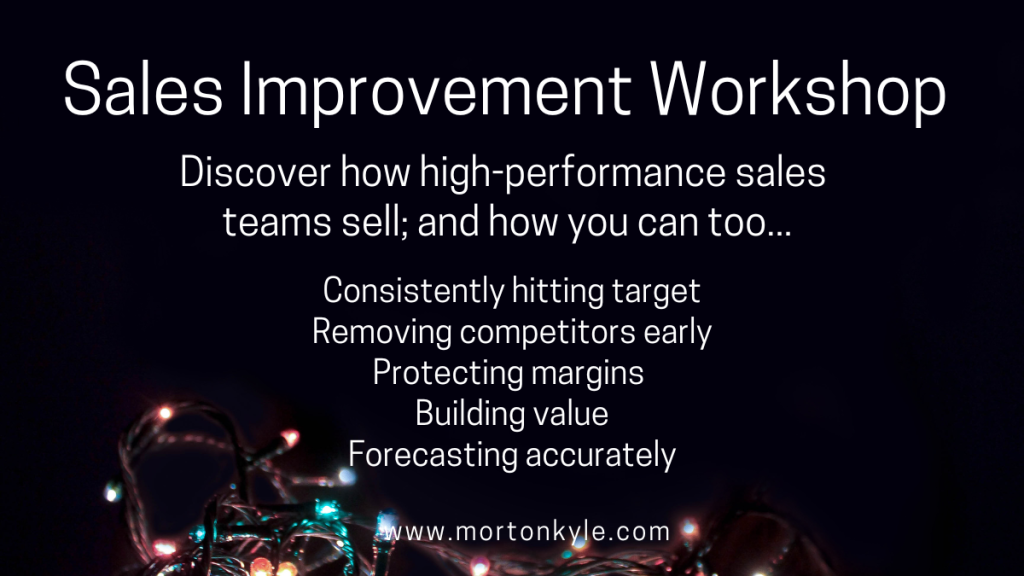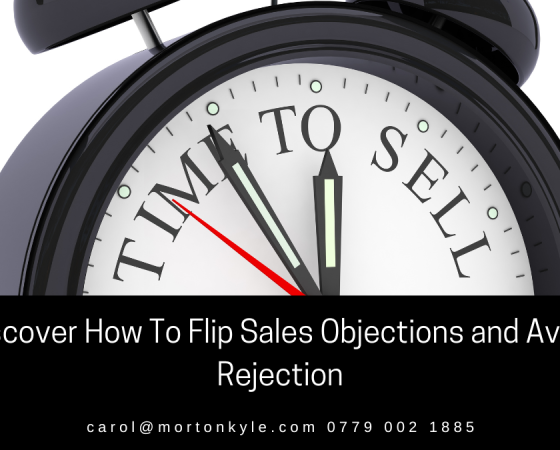Handling sales objections should give you the biggest thril, the highest high and the greatest kick!
To be great at sales you’ve got to love the sales objection.
You’ve got to love it some much that you want it to happen, you want it to happen fast, in fact you’re so keen for the prospect to object that you taunt him with your promises, your claims and your expertise him until he does objects!
Because at that point, you know the worst has happened.
And you have the joy of knowing you can deal with it!
You know you can flip it.
AND you know that the sales rejection won’t kill you or destroy your chances of going for the close!
In fact – when you start hearing sales objections – that’s the time to start selling the most by asking questions to dig down to the next level…
A NO means this is your time to sell using high quality, detail orientated and focussed sales questions.
Does That Describe How You Go About Handling Sales Objections?
If it does – great – you can move on, nothing to see here…
On the other hand, if what you’ve just read has you shaking you head and claiming I’m on some mood enhancing substance (chocolate hob nobs in case you’re wondering) then read on…
If you’re not openly welcoming sales objections, if you’re not trying to flush out any sales resistance early, if you’re going for the sero resistance sell hoping that the prospect puts up no barriers to you getting the order signed then you’re probably avoiding the greatest chance of success because you fear the objection more than you want the sale!
If that’s you, remember this:
Some Will, Some Won’t, So What….
Death Due to Sales Rejection
It’s not a headline you’ve ever seen is it?
Wonder why…?
Because it’s never happened!
But what dawned on me last week is that lots of sales people suffer from Fear of Sales Rejection, and of those that don’t suffer from this crippling disease, then many of them are carriers.
Sales Rejection | Are You Infected or a Carrier?
Check out these symptoms: is this you
- Do you have a genuine belief that most buyers will say no to your offer?
- Sometimes praying that the buyer will say no quickly so you can update your sales pipeline and move on to the next sales prospect who you also expect to say no?
- You have a tendency to either close too early, before you can guarantee a yes or…
- Maybe you close to late, by which time the buyer has forgotten why he was even talking to you…or
- You don’t close at all because you’d rather have some sales pipeline of questionable value than an empty pipeline?
- When your prospect does say no, you take that no, utter something about keeping in touch, sending an email from time to time and end the call, update your CRM and move on
How many of these symptoms have YOU got?
How about the people around you, in your team, do you recognise any of the symptoms in your colleagues?
Is it fatal yet?
I ask because sometimes we call catch sales rejection, might just be for a day, a week, a month, may just be when we hang out with certain people…but the first step to recovery is recognising we have it, and then set about curing it.
Because the Cure for Sales Rejection is Out There!
And it’s a cure worth taking because handling sales objections should be you at your best…because now is the time.
Think of it this way…
- If your prospect is objecting, he’s engaged.
- If your prospect is throwing sales resistance in your path…he’s seeking more information, clarification, proof.
- It the sales prospect is digging deeper and sucking up the fine detail …he’s probably thinking about how he can sell this solution you offer to himself, his team, his boss, finance…
You get my drift…objecting is a positive, it’s a cry of
- Show me more
- Tell me more
- Prove it to me
- Give me the details…
- Ask me more relevant questions
- Make it more about me
Very few ‘NO’s are hard NO’s.
Some ‘NO’s just mean help!
When you hear ‘NO’ – what the buyer is actually saying is::
- I can see it yet…
- Keep asking me questions…
- Tell me some more….
- Slow down….
- Help me understand….
- What does this mean…
- Piece it all together for me…
So, when you hear NO – use it as a golden opportunity to dig in and start asking the next level of questions.
Super smart questions to unpack the confusion, and clarify the real connections between your solution and their problem, using the prospects lens as the filter.
Step outside the sales view finder and seat yourself next to the buyer and dig into their thinking.
Sales Rejection | The Story of Stephen.
I see Stephen 4 times per yr as part of a Sales Audit I do for a national client. Steve is a top performer. He’s the guy I ask everyone to chat with if they’re struggling with sales.
Firstly, because he’s a really nice guy, but also because he treats his prospects and his sales pipeline with respect
Steve tells it like it is. He challenges when he needs to, is great at listening, asks fantastic questions, and always closes. Everytime. He creates the conditions with the buyer where he doesn’t close until he knows he’ll get an answer he likes!
BUT the reason Steve consistently smashes his sales targets, his cross sell lead gen, his up sell, and the reason why his average sales order value and customer lifetime order value is higher than anyone else is because Steve knows how to handle objections.
At this, Steve is a GOD!
So, having spend the week with Steve and his colleagues I move on to do some preliminary work on a sales turnaround project ready for next month.
Faced with a failing sales function, and some real anti-sales, almost sales prevention, selling techniques during sales call review, I couldn’t help but ask myself, when it comes to sales rejection…
What Would Steve Do?
Here’s the guidelines Steve uses for handling objections, minimising sales rejection and turning that sales rejection into an order and an invoice.
Here you go:
Steve only asks for the order when he knows he’s going to get a yes.
So, Steve reduces the times he can get hit with the Sales Rejection virus.
Until that point when Steve asks for the order and expects to get a yes, he uses that time by being a very valuable person to the buyer.
During which, Steve is simply asking questions.
Steve gets the buyer to clarify their own thinking, instead of bombarding his prospects with his noise.
He challenges some of the buyers beliefs.
Steve provides valuable insights, experience and acts as a first class peer to peer sounding board.
Steve is also working with the buyer to help the buyer understand the cost of not buying. That’s a cost not just within his own business, but within the buyers, competitive market.
After a while, the buyer sees Steve as a very valuable person to talk to.
In fact, the buyer often calls Steve to have a chat about some aspect of the industry, competitors and, well, just stuff.
The buyer is interested in Steve’s thoughts and views.
It’s almost like the buyer has forgotten Steve is there to take his money off him!
What Else Would Steve Do When He’s Handling Sales Objections?
That’s a good question.
Steve never takes the first ‘no’ as an actual ‘no’.
That would never occur to him to take the first ‘no’ as a final sales rejection.
When Steve hears ‘no’ from his contact what his brain does is flip it immediately into…’I’m not sure at the moment, let’s talk some more and then ask me again’
Do you know how much difference that makes to Steve’s sales performance?
Huge amounts, so let’s take a closer look.
‘I’m not sure at the moment’
Ok, so how does Steve flip this?
First of all, let’s understand that Steve, wasn’t expecting this response, because, as above Steve doesn’t ask until he’s sure he’ll get a yes.
So the first thing Steve needs to do is look at where the mismatch is, because obviously he and the buyer aren’t on the same page any more.
So maybe he asks…
Ok, so the time’s not right at the moment. What needs to change, for everything to slip into place so you can go ahead?
Now, think about what this question encourages the buyer to do, and how Steve can benefit from this.
Then perhaps Steve asks,
Right, thanks for that. I understand where you’re coming from now. You know we talked about you losing £X K every month you didn’t have this solution in place? How viable is it really, as we sit here today, knowingly writing off a loss of 6 months worth of £XK whilst you get these other elements sorted? Instead, together, let’s find a better work around than this?
What Steve’s just done, because he’s already calculated the Sales ROI for his buyer before the sales close, is be able to quantify the money lost due to waiting …the cost of doing nothing!
In doing that Steve’s asked the buyer in the nicest possible way…’Are you TOTALLY insane?’
But the buyer won’t hear that. Instead he’ll see Steve trying to help him save money.
What Steve has also done, is make himself part of the fix with the buyer. Now they are a team. It’s a peer to peer conversation – not a battle of wills in a tense sales arena with the buyer running scared as happens here: Anyone Seen My Buyer?
And, faced with sales objections, it doesn’t stop there…
It doesn’t stop because the buyer has given Steve an insight into what the blocks are, now Steve needs to challenge the buyers thinking and reframe those blocks as something else, maybe milestones, gateposts but certainly not full stops in the sales process.
Steve now goes into a counselor mode with the buyer, where his job is not to provide solutions, but just to ask his buyer the right questions.
Steve wants his buyer to come up with the solution.
And, Steve wants his buyer to have clarity on that solution.
Steve wants his buyer to own the solution, because, when that happens the buyer doesn’t say no to his own ideas!
What Doesn’t Steve Do?
He certainly doesn’t take the first no
He doesn’t take the second or third no either
Doesn’t offer to leave the buyer to take up the conversation with a competitor…especially having done all the hard work.
He doesn’t say ‘ok, I’ll update my file and give you a call in 6 months to see if anything has changed’
He doesn’t burn sales leads and opportunities
Why Does Steve Refuse to Catch Sales Rejection?
That’s the killer question in this.
Why does Steve not fold at the first no? Especially when so many other sales people just accept sales rejection as part of the job?
Because Steve has a single focus. This means Steve will never ever be a sorry victim of sales rejection, and here’s why:
Steve never progresses poor quality sales prospects through his sales pipeline…he cuts then loose when he realises either the prospect is not a fit for his solution or the solution is not a fit for his prospect buyer.
What this means is, that by the time the buyer is ready to be closed, Steve knows it’s a great fit. Steve knows there is huge value for the buyer and that the buyer knows this.
Which means it’s not about shoe horning a solution in. Instead it’s simply working out the the final details based on a foundation of great advice, trust and education.
Steve doesn’t carry low level prospects with a vague interest in buying with a low value payback on his solutions. He leaves those to the other competitors in his field.
Sales rejection, and the potential to be subjected to sales rejection starts at the very beginning of the sales qualification process.
Steve knows this.
That’s why he has the best sales conversion rate. The highest average sales order value, the biggest lifetime order value.
It’s the reason why Steve smashes his cross sell lead generation target and why CSI score is the highest in the team.
Discover How You Can Handle Sales Objections and Avoid Sales Rejection Too
You can join us on or bespoke or open B2B sales training courses – you can check out the dates for The Sales Improvement Workshop

To discuss how to build a productive, efficient and high performance sales team, call / text Carol on 0779 002 1885
Handling sales objections, dealing with sales rejection need not be a sales killer but leaving sales objections to the end of the sales process definitely increases the chances of experiencing the rejection and final ‘NO’ which could so easily be avoided.

Hi, welcome to Morton Kyle Limited.
As Founder and Lead Consultant, I’ve spent the last 30+ years in the trenches of sales—fixing broken pipelines, rebuilding underperforming teams, and helping businesses close more deals at higher margins.
I’ve worked with global brands, challenger firms, and fast-growth sales teams, helping them:
✔ Fix underperforming pipelines – turning ghosted leads into closed deals.
✔ Increase win rates – without discounting or chasing bad-fit prospects.
✔ Build sales systems that actually work – so you don’t waste time on ‘busy work’ that doesn’t convert.
I’m not another ‘sales trainer.’ I don’t teach theory. I fix sales problems – fast. And if you’re still reading, it means you’ve got a problem that needs fixing.
I know how sales leaders think because I’ve been one. I know what the board wants because I’ve sat in those meetings.
And I know what works – because I’ve done it, tested it, and proved it across industries, markets, and economic downturns.

